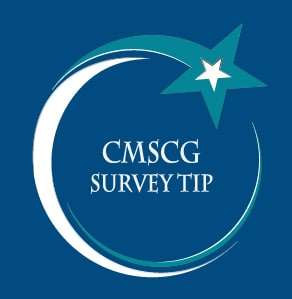Next up on the CMSCG Blog, we’re reviewing one of the regulations from the Food and Nutrition regulatory group, F806 Resident Allergies, Preferences and Substitutes. This regulation doesn’t include a lot of content, but it can easily pack a punch on survey with a widespread (S/S: F), harm or Immediate Jeopardy-level citation, so it’s important to understand the requirements.
F806 – Regulatory Requirements
Per Appendix PP of the State Operations Manual, F806 states that the facility must provide, and residents must receive:
- Food that accommodates resident allergies, intolerances and preferences. The Interpretive Guidance (IG) indicates that facilities need to be aware of these concerns and provide an appropriate alternative to the resident.
- Appealing options of a similar nutritive value when residents choose not to eat the meal scheduled on the menu or request a different meal choice. The IG indicates that food substitutes that are provided should be consistent with the usual and/or routine food items that are provided to residents.
On Survey

Like many of the other Ftags in the Food and Nutrition regulatory group, surveyors identify issues through visual observations at mealtimes. Meals are a great way to identify deficient practices, particularly when a resident is observed to be refusing/ not consuming the food and beverages put in front of him/her at mealtime.
The surveyor then has the opportunity to interview the resident – and staff, if necessary – to determine if the resident is offered substitutes, how they know about what alternate menu choices are available and if the meals served to them meet their preferences and/or allergies/intolerances. What do you think your residents will say? If you’re not doing dining observations in your own facility, you’re making a mistake.
If you’re not doing dining observations in your own facility, you’re making a mistake. CMSCG recommends that routine meal observation rounds are conducted by Food Service staff, dietitians, therapists, the SLP and nursing at different meals and on different units.

Let’s review a couple deficient practices observed during recertification surveys to see how easy it is to end up with a citation.
F806 S/S: G – Recertification Survey
A facility was cited for failure to ensure a resident’s food preference was honored after the resident complained to her family that she disliked chopped foods. The resident’s family notified the facility that she did not like chopped food or tomato soup and requested sandwiches but she was not provided them. The resident was not provided with any food upgrade options, and she continued to be served tomato soup. The surveyor observed the resident being served chopped Swedish meatballs and spoke to the resident who stated that she was not going to eat any chopped food and her son had told the staff, but they didn’t do anything about it. She further stated that when she saw her roommate getting breakfast items like toast and bacon, it made her mouth water. The surveyor interviewed the SLP who stated that she had not been notified that the resident should be reevaluated for a food upgrade. The resident’s decreased food intake resulted in an unplanned weight loss – thus resulting in the facility being cited with an Actual Harm (S/S: G) deficiency for F806.
If you could potentially end up with a harm-level deficiency for not accommodating a resident’s preferences, imagine what could happen when you don’t address resident allergies. If you can’t imagine it, take a look at this next citation.
F608 S/S: K – Recertification Survey
Unfortunately, it didn’t take a lot of research to identify Immediate Jeopardy citations for F806, which should be a sign to you to review your facility’s practices around identification of allergies and ensuring appropriate food substitutions are made for residents with allergies and intolerances.
A facility was recently cited at a S/S: K (Immediate Jeopardy – Pattern) when it failed to ensure two residents who had food intolerances and allergies were appropriately assessed for food allergies. Several things went wrong here, but the issue began when two residents who were allergic to fish were served tuna casserole. During their review, the survey team found that:
- The residents’ physician was not aware that both residents were allergic to fish
- The physician was not aware that in addition to a fish allergy, one resident was also lactose intolerant, but was served a milk-based protein supplement
- The residents’ food allergies/intolerances were not included in the physician orders
The nurse who admitted the residents did not document their allergies as indicated by the residents and the dietitian did not follow up to verify the presence of allergies or intolerances. Documented on the residents’ meal cards as “dislikes” were the items the residents were actually allergic to. Surveyors observed these items still being served to the residents despite the indication on their meal cards that they should not receive fish, and for one resident, milk. Even after one resident reported his fish allergy to the cook, this concern was not addressed by the facility. This is where the IJ situation started – with two residents – and then it was identified that multiple other residents with food allergies/intolerances could potentially be affected by these same practices.
Thankfully, while there was no actual negative outcome to any of these residents, there could have been. We won’t provide the gory details on the resident who had a documented allergy to an ingredient used in a salad dressing he was served. That resident was sent to the ER and ultimately ended up intubated and admitted to ICU.
Thinking about Alternatives
There are a number of issues that have been identified during surveys related to alternatives. It’s important to ensure that your residents are aware of the menu alternatives – all of them. Often when we speak to residents during Mock Surveys, they indicate that the only alternative is a sandwich, but the facility has an “always available” menu that includes hot and cold items that all the residents aren’t aware of. Ensure your residents are educated about their options and that their preferences are accommodated. Let’s review two other recertification survey citations to reinforce why this is so important.
A facility was cited for failure to provide a vegetarian alternate meal of similar nutritive value for one resident and not ensuring that peanut butter and jelly sandwiches were of similar nutritive value to the regular entrée. As a result, this had the potential to impact approximately 30 residents who received regular texture food.
During this survey, the surveyor was looking at the compared nutritive value of the alternates being served. During observation of the alternate sandwiches being prepared, the vegetarian option (grilled cheese) was compared to the regular entrée (roast pork) and there was a significant difference between the protein in the two entrees (25 grams for the pork vs. 6 grams from the two slices of cheese used for the sandwich). Further observation found a staff member putting peanut butter and jelly on bread. During interview, that employee said she did not measure the peanut butter. The recipe for the sandwich called for 2 tablespoons of peanut butter, which resulted in a sandwich with 16 grams of protein. It was later confirmed that no additional items were served with the PB&J, making it not an equal substitute to the nutritive value of the entrée.
Observations of staff preparing food in the kitchen will occur during survey, so this is one way that the alternates can be found to not be of equal nutritive value. Another way that issues with alternates can be identified is during meal observations, as you’ll see below.
F806 S/S: F – Recertification Survey
A facility was cited under F806 at a scope/severity of F (widespread) when it was identified that for every resident except one, the facility failed to offer options of a similar nutritive value to residents. The only alternative meals available were sandwiches and soup. During a lunch observation, the surveyor noticed that multiple residents were served a sandwich, potato chips in a Ziplock bag and beverages. Review of their meal tickets regarding substitutes only indicated options for soup or a variety of sandwiches. On interview, one resident stated that she had a lot of food allergies to items used for the main menu, so she ended up eating only soup and sandwiches frequently. Another resident was interviewed and told the surveyor that at dinner, they can only have a sandwich or soup if they don’t like the entrée. A third resident told the surveyor that he gets tired of eating soup and a sandwich all the time because he often didn’t like the main meal.
On interview with the Dietary Manager, it was confirmed that only sandwiches, soup or salad were available for alternates. The consultant dietitian was interviewed and indicated that she was unaware that these were the only items offered as alternates.
CMSCG Dietary Consultant Kelly Hellberg, MS, RD, CDN weighed in on this citation with the following information. What’s considered an appropriate alternative can be a sandwich, so long as it has the same nutrient value as an entrée. However, it can be a bit subjective as to whether it’s an “appropriate” substitute for an entrée like meat and potatoes. If the main entrée is a hot item, then the alternate should also be a hot entrée. It’s also important to ensure that residents feel there is enough variety to the alternates so their preferences can be accommodated. This seems to have not been the case at this facility, where there was too much limitation on the same alternates for its residents.
These citation examples should really be an incentive for staff to take a look at what is happening during mealtimes in your facility. While you are at it, jot down some names of residents with concerns and assess what is actually in their medical orders, nutrition progress notes/assessments and don’t forget the CCP.